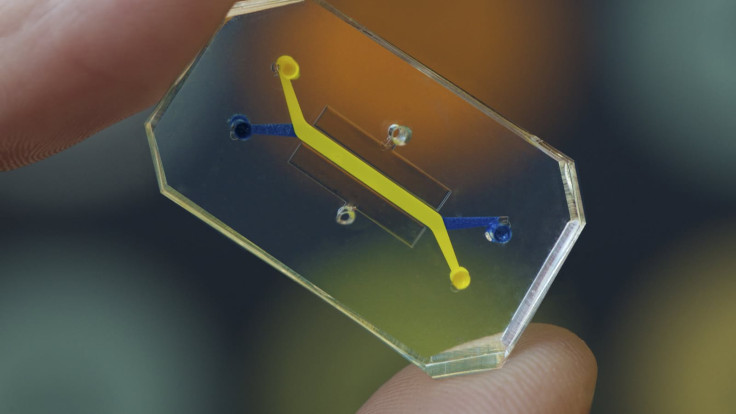Human organs-on-chips: Harvard develops microchips lined with living cells to revolutionise medicine
Microchips lined with living human organ cells will transform how diseases and drugs are tested.

Biological engineers at Harvard University's Wyss Institute for Biologically Inspired Engineering have invented a microchip that can be lined with living human cells in order to revolutionise medicine, particularly relating to drug testing, disease modelling and personalised medicine.
The 'human organs-on-chip' is a microchip made from a clear flexible polymer that contains hollow microfluidic channels that are lined with living human cells, together with an interface that lines the interior surface of blood vessels and lymphatic vessels, known as an endothelium.
The idea is that the microchip can emulate the microarchitecture and functions of multiple human organs such as the lungs, kidneys, skin, bone marrow, intestines and blood-brain barrier. And if you were able to do this, you could then test out drugs and study how diseases affect the body without having to endanger human patients, or waste precious organs needed for transplants.
At the moment, some scientists in various countries are focused on bioprinting, which refers to 3D printing human cells. They want to use cells for drug development and disease modelling as well, but the problem there is currently no known way for humans to grow artificial organs.
It's not currently possible to create artificial organs
If you 3D print cells or try to grow them in a petri dish, they don't work because they're two-dimensional on the dish, whereas they would be three-dimensional in the body. Each organ also contains multiple different types of tissue, and the body sends signals to the cells telling them what type of tissue to turn into.
Without the signals from the body to tell them what to grow into, not much can be done with artificial cells, except to try to implant artificial cells back into the body and hope the body makes them grow, as Chinese scientists recently did with monkeys and 3D printed blood vessels.
This is why it's not possible to make artificial bone marrow or organs for emergency transplants, and when it comes to drug development, there's only so far animal testing can go.
Ideally, you would need to test the drug out on humans to ensure that it works, but drugs can often make people really sick, so usually drugs can only be tested on humans in the very last stage, when it seems almost certain that the drug is safe, and even then, the drug can still cause bad side effects that might only be noticed once it is on the market. Plus, testing just one drug compound can cost over $2bn (£1.7bn).
Now you can test drugs and diseases on cells outside the body
However, if you have a microchip which can contain cells from multiple organs and the ability to create an artificial vascular system, even if it is miniscule, you can use it to test how drugs and bacteria interact with the body, or to see how exactly diseases and smoking harm the body.
And if you wanted to test the effect of a disease or drug on the whole human body, you can, because the researchers have developed an automated instrument that can link multiple 'organs-on-chips' devices together via common vascular channels, so that scientists can observe the complex interconnected biochemical and physiological responses across ten different organs at the same time.
Emulate Inc, a start-up spun off from Wyss Institute, will now seek to commercialise the organs-on-chip technology as well as the automated instruments, while Wyss Institute will continue improving the organ-on-chip platform to explore the potential for personalised medicine, as well as to identify new therapeutic targets and clinical biomarkers.
The institute is also seeking to see whether it would indeed be possible to completely 3D print an artificial organ on a chip, such as a heart with integrated soft strain sensors, and is keen to hear from any companies or institutions that would like to partner with it on all these research topics.
"We took a game-changing advance in microengineering made in our academic lab, and in just a handful of years, turned it into a technology that is now poised to have a major impact on society," said Donald Ingber, the founding director of the Wyss Institute at Harvard University.
© Copyright IBTimes 2025. All rights reserved.






















